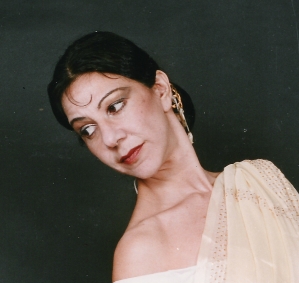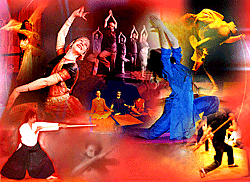 The Mandiram Centre is a non-profit society of a multi-cultural character, unique in Greece.
It was established in 1985 by Leda Shantala on her return to Greece, to transmit her rich experiences and knowledge, with the goal that it will become a "Place" (this is the meaning of the word "mandiram" in Sanscrit) of meeting, of discussion and resolution of the many issues and problems posed by our times. The Mandiram Centre has grown and flourished through the years as an educational and artistic institution. The Mandiram Centre is a non-profit society of a multi-cultural character, unique in Greece.
It was established in 1985 by Leda Shantala on her return to Greece, to transmit her rich experiences and knowledge, with the goal that it will become a "Place" (this is the meaning of the word "mandiram" in Sanscrit) of meeting, of discussion and resolution of the many issues and problems posed by our times. The Mandiram Centre has grown and flourished through the years as an educational and artistic institution. 
The need for a permanent artistic venue came with its expansion and the expansion of the audience of the performances, and generally of the number of people interested in our goals.
The progress and the fidelity of our pupils, many of which continued brilliant studies abroad, as well as the growing number of interested people, were factors that encouraged us towards the creation of this new venue, which enables us to complete our artistic goals. This new venue, the Shantom House of Culture, has been hosting the activities of the Mandiram Centre as well as of the Leda Shantala Dance Theatre,
expanding them, and seeks a fertile collaboration and dialogue with other artists and scholars.
>Leda Shantala, a pioneer artist and scholar, wanted, through the Mandiram Centre, to pursue mainly the following six goals:
| 1. The teaching and propagation of Indian Classical Dance Bharata Natyam through an educational system which follows an evolutionary course of learning, from the beginner's
first steps to the most advanced and the richest form of artistic expression. The Mandiram Centre - and now the Shantom House of Culture - hosts the Greek Bharata Natyam Academy - the only school in Greece where Bharata Natyam is taught in a professional and complete way, forming dancers who may, if they wish, take part in the performances of the Leda Shantala Dance Theatre. |
2.
The teaching of yoga , taking into account
the personal needs of each practitioner, as well as the
needs of the contemporary lifestyle. Yoga, through
its ancient scientific knowledge, offers the practitioner
a powerful tool, provided it is imparted properly. Leda
Shantala, having studied yoga in depth, in the most reputed
schools of India and Western Europe, and as a pupil of sages-philosophers
who are amongst the most important Indian and European yogis
today, as well as drawing on her rich experience of many
years, can guarantee authenticity and excellent results
in the fields of psychosomatic wellness and spiritual uplifting. |
3.
The conducting of therapeutic sessions through dance movement therapy to
counteract stress and promote psychological relief, self-knowledge,
expansion of creativity and cultivation of comfort, for
a more joyful and productive life. |
| 4. The
development of the possibilities in communication and the
emancipation of the personality of the individual, through
comprehension and solving of behaviour stereotypes in movement
and in thought. |
| 5.
The creation of the Leda Shantala Dance Theatre and the creation
of original, qualitative performances, where the results
of the above research can be interpreted in dance and theatrical
action. |
| 6.
The spanning and collaboration between therapeutic and spiritual
practices of ancient cultures such as yoga, meditation, exctatic
practices and therapeutic dances of primitive tribes on one
side, and contemporary knowledge and psycho-spiritual methods
offered by Western science on the other. |
|
